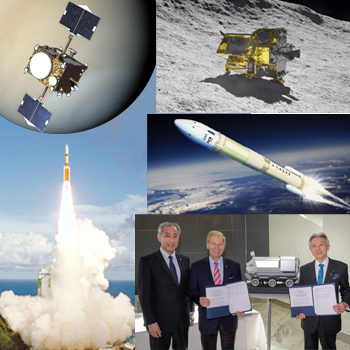Japan Sets H2A Launch This week, H3 in October, Prepares for Human and Robotic Moon Landings via USA and India Collaboration
JAXA is set to launch its liquid-hydrogen and liquid-oxygen fueled H-2A rocket, operated by Mitsubishi Heavy Industries, September 11 from LA-Y1 pad at Tanegashima Space Center in Kagoshima Prefecture. It will loft reconnaissance satellite IGS Radar 8 for national defense and civil natural disaster monitoring to LEO. H-2A rockets also launched JAXA missions Smart Lander for Investigating the Moon (SLIM – which operated near Shioli crater at 13°S 25°E for an incredible 3 months and 10 days) and Akatsuki (Venus orbiter that overcame orbital challenges and operated for 13 years and 11 months, finally losing contact just this past May 29). The H-3 rocket, also a collaboration between JAXA and Mitsubishi, has its 4th launch planned for October 20, carrying the DSN 3 (Kirameki 3) geostationary communications satellite. The inaugural launch failure of H3 in March 2023 was followed by a success in February 2024 and another in July 2024. A Japan astronaut may become the first international partner to land on the Moon after NASA-USA via Artemis program (NET 2028). The India Lunar Polar Exploration Mission (LUPEX) mission to explore the Moon South Pole region NET 2026 will involve Japan, which will contribute the rocket and rover to ISRO’s lander. Looking toward deeper space, JAXA Martian Moons eXploration mission (MMX) is to launch 2026, and Japan contributed instrument components and researchers for the ESA JUICE mission enroute to Jupiter moons. (Pictured: JAXA President Hiroshi Yamakawa, NASA Administrator Bill Nelson, Japan science Minister Masahito Moriyama; Image credits: JAXA, NASA, Bill Ingalls) |
MONDAY☆ Sep 9 — International Space Station, ~415-km LEO: Expedition 71 seven Astronauts and Boeing Starliner CST-100 two members await September 11 arrival, for ~6-month stay, of Roscosmos Cosmonauts Ovchinin and Vagner, and NASA Astronaut Don Pettit, who is featured in a video speaking of the “science of opportunity” while in space. ☆ Sep 9 — Tiangong Space Station, ~390-km LEO: Shenzhou 18 three-member crew are studying anaerobic archaea, one of Earth’s early forms of life, a single-celled organism that produces methane as found on Mars, testing their survival under Mars-like conditions and extreme cosmic radiation. ☆ Sep 9 — Mercury: At perihelion, 05:00. ☆ Sep 9 — Apollo Asteroid (2024 QS): Near-Earth Flyby (0.03 AU) Ongoing… o Sep 7-10 — Lunar Exploration and Spaceflight Engineering Center of CNSA, Chinese Academy of Sciences, Harbin, China: Forum on the scientific exploration and research of the Chang’E-8 mission, including basics, scientific objectives / tasks / payloads, preliminary technical plan and modes of operation. o Sep 8-13 — Europlanet Society, Berlin, Germany / Virtual: Europlanet Science Congress EPSC 2024; gathers 1000+ participants in planetary science and missions, both within the Solar System and beyond. TUESDAY☆ Sep 10 — JAXA, Launch H2A / IGS Radar 8, Tanegashima Space Center, Japan: Next H2A rocket operated by Mitsubishi Heavy Industries to launch Japan radar reconnaissance satellite to SSO, 18:00 HT. ● Sep 10-12 — Lunar and Planetary Institute, Johnson Space Center, NASA, Houston TX: Isotope Geochemistry and Cosmochemistry Workshop. ☾ Sep 10 — Moon: 0.26° SE of Antares, 04:00; At First Quarter, 20:06. ☆ Sep 10 — Apollo Asteroid (2020 PM7): Near-Earth Flyby (0.08 AU) |
 |
● = Terrestrial and… o = International terrestrial events
☾ = Moon activity ★ = Space and… ☆ = International space / astro events; in Hawaii Standard Time unless noted. Add 10 hours to obtain UT (‘Universal Time’). |
Weekly Planet Watch – Morning Planets: Mercury (ENE), Mars (E), Jupiter (E); Evening Planet: Venus (W).
Europe Thriving with Space Business and Research Events
Europlanet Science Congress EPSC 2024 will convene in Berlin and online September 8-13, to cover planetary science and missions. Europlanet Society first mounted the event in 2006 and expects 1,000+ this year. Presentations on Lunar science, Mercury, Venus, Mars, Jupiter, Saturn, Jupiter moons and small bodies are among many other topics. Scotland, with 150+ aerospace companies, manufactures more small satellites than anywhere else in the world except California. Space-Comm Expo Scotland, September 11-12, expects 3,000+ attendees. Sponsors are DLA Piper, Lockheed Martin, Saxavord UK Space Port, Skyrora, Space Scotland, STAR-Dundee, UK Space Trade Association and Zeiss; 35 partners span media, government, manufacturing and other business. In Paris or online, the 27th annual World Space Business Week expects 1,600+ leaders from 50+ countries to meet September 16-20; 286 speakers are founders, CEOs or other high-level executives from their respective organizations. Two overarching subjects are satellite financing and Earth observation business. Awards will be given to innovators. There will be a contest to pitch ideas to investors. SPAICE 2024: AI in and for Space will be September 17-19 at ECSAT in United Kingdom. It is envisioned for exchange of scientific challenges and ideas where space and AI intersect. Subjects can be proposed on the 1st day and incorporated into the conference on the 2nd day. Keynotes and oral / poster presentations are included on the agenda. (Image credits: Novaspace, Hub Exhibitions) |
WEDNESDAY☆ Sep 11 — Roscosmos, Launch Soyuz 2.1a / Soyuz MS-26, Baikonur Cosmodrome, Kazakhstan: Crewed mission with Roscosmos Cosmonauts Aleksey Ovchinin and Ivan Vagner, and NASA Astronaut Donald Pettit to ISS for ~6-month mission, 06:23 HT. o Sep 11 — Academia Sinica Institute of Astronomy and Astrophysics, Taipei, Taiwan: Colloquium: presented by Sherry Suyu of Technical University of Munich, 14:20-15:20. o Sep 11-12 — UK Space Agency, Space Scotland, Hub Exhibitions, et al, Glasgow, Scotland: Space-Comm Expo Scotland: Where Space Does Business; premier platform for the Scottish space industry; Scottish Event Campus Exhibition Way, free. ☆ Sep 11 — Mercury: At ascending node through the ecliptic plane, 13:00; At westernmost elongation; 18.0° from Sun in morning sky, 16:00. ☆ Sep 11 — Aten Asteroid (2016 TU19): Near-Earth Flyby (0.02 AU) THURSDAY★ Sep 12 — SpaceX, Falcon 9 Block 5 / 5 AST BlueBirds, SLC-40, Cape Canaveral FL: First 5 BlueBird communications satellites to LEO, each ~65 sq m when fully unfurled; AST aims to make every cell phone a satellite phone; live coverage of launch, 04:52 EDT. ☆ Sep 12 — Jupiter: At west quadrature, 90° from Sun, 01:00. ☆ Sep 12 — Apollo Asteroid (2024 QS1): Near-Earth Flyby (0.03 AU) FRIDAY● Sep 13 — American Astronautical Society (AAS), American Institute of Aeronautics and Astronautics (AIAA), Kaua’i HI / Online: Abstract Deadline, including for Breakwell Student Paper Award grant, for 2025 AAS / AIAA Space Flight Mechanics Meeting of January 19-23. ☆ Sep 13 — Aten Asteroid (2023 RA10): Near-Earth Flyby (0.06 AU) |
SATURDAY
o Sep 14 — International Observe the Moon Night Organization, Global: International Observe the Moon Night 2024; encouraging observation, appreciation, understanding of the Moon and its connection to planetary science & exploration; 1st quarter Moon is considered the best time to observe the Moon due to shallow angle of sunlight hitting surface and illuminating details.
● Sep 14 — American Institute of Aeronautics and Astronautics Los Angeles Section, Online / Los Angeles CA: Developing Space Satellite Services: Enhancing Communication & Data Management for Next Gen Missions; presentation by Asim Robinson of Surgestreams, 10:30 PDT.
● Sep 14 — Jet Propulsion Laboratory – California Institute of Technology, Pasadena CA: Educator Workshop – NASA ASTHROS Mission for educators of grades 2-12; Von Karman Auditorium, 10:00-12:00 PDT.
☆ Sep 14 — Mars and Venus: At heliocentric conjunction, longitude 54.5°, 06:00.
SUNDAY
★ Sep 15 — SpaceX, Launch Falcon 9 Block 5 / Galileo L13 (FOC FM26 & FM28), SLC-40, Cape Canaveral FL: SpaceX to launch 2 satellites to LEO for Europe Galileo navigation system, 12:57 HT.
● Sep 15-17 — Advanced Maui Optical and Space Surveillance Technologies (AMOS), Millennium Space Systems, Space Generation Advisory Committee (SGAC), Maui HI: 7th annual EMER-GEN® with mentoring / networking for young professionals and students interested in careers in space.
☆ Sep 15 — Apollo Asteroid (2019 DJ1): Near-Earth Flyby (0.03 AU)

